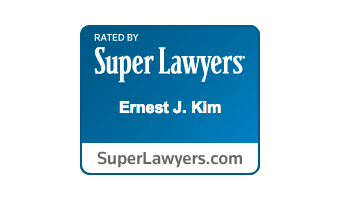Probate of A Decedent’s Estate
Probate is a court-supervised process for distributing the individually owned assets of a deceased person. A full probate process takes an average of 1 to 2 years in California. Probate carries a lot of responsibilities for the surviving family members, and the court process is often daunting, even for lawyers who are not experienced with probate matters. The Law Offices of Ernest J. Kim can help guide your loved ones through the process. We can provide specific services, or handle the entire probate process so your family doesn’t ever need to step into a courtroom.
In Probate court, estate assets are distributed to beneficiaries in accordance to the instructions written in the person’s will. If there is no will, the assets are distributed according to the laws of intestacy pursuant to the California Probate Code.
Estate administration can be complex and Executors and estate administrators should seek advice from experienced counsel to guide them through the process. Executors and administrators must make important decisions – often quickly – and they should seek professional advice from tax and financial professionals to make the best decisions.
Our firm has guided other attorneys through the Probate process, and we stand ready to assist you or your family.
For detailed information about the process of probate and working with our firm, please check Our Process pages.
Other Probate Court Proceedings
Many people don’t realize that they and their children can end up in probate court even before anyone has died, and that probate court isn’t just for Wills and inheritance issues after they pass away. With proper planning, probate court could be totally avoided, but many people don’t have a proper plan in place.
Conservatorship
Once a person reaches adulthood, they have the legal right to make decisions for themselves (their “person”) and their own property (their “estate”). If an adult becomes ill or injured and is not able to handle their own decisions and/or property any longer, they will likely need a conservatorship established in court so that another person has the legal authority to make these decisions for them. The simplest example is if a person is unconscious and in a coma; they can’t speak to doctors or make decisions about medical treatments, or go to the bank to access their money to pay medical and other bills, and someone will need to act for them to do these things.
There are many other health related scenarios in which a person may still be awake, mobile and conscious, but still be deemed unable to make decisions, such a with dementia or Alzheimers patients. A conservatorship is a court proceeding where a judge considers relevant information about the person’s mental capacity and makes a decision about whether or not the adult can still make their own decisions, and whether the person’s own decision making authority should now be turned over to someone else because they are too impaired. If the judge decides this is the case, they will determine that someone else should make decisions for the incapacitated person and legally take away the right of the impaired or incapacitated person to do so for themselves. A famous recent conservatorship case was Britney Spears, whose father took charge over her and her assets during the time she was deemed unable to act on her own behalf.
Decisions regarding personal care and medical treatments are turned over to a Conservator of the Person; while decisions over property are turned over to the Conservator of the Estate. It’s important to know that every capable adult has the right to choose the person they want as their own conservator and also has the right to avoid a court conservatorship altogether by setting up a Durable Power of Attorney (“POA”) which is a legal document giving someone they trust the power to make financial decisions for them. However, most people have never taken the time to make a POA to record these important decisions and choices. A Living Trust can also help avoid a court conservatorship over assets by giving a Successor Trustee the ability to manage Trust assets on behalf of the incapacitated person. An Advance Healthcare Directive (“AHCD”) is a legal document that can be used to appoint someone to make medical and personal care decisions on your behalf, that would otherwise require a court conservatorship if there was no AHCD in place.
A POA, AHCD and a Trust are all key components of our Living Trust/Estate Planning Packages. Most people would much rather choose their own decision maker – someone they chose without having to go to court – rather than let a probate court judge decide who their decision maker should be. A court conservatorship is financially costly and takes months to establish, and everything becomes public record. Conservatorships can be avoided with a proper estate plan. We help our estate planning clients and their families avoid the need for probate court during their lives with a complete estate plan. For those who need a conservatorship over a loved one, we can help get a conservatorship established.
Guardianship
Children under the age of 18 are not legally able to make most decisions for themselves or handle most financial transactions. If minors are earning money, inheriting property or are named on insurance policies or accounts as beneficiaries to receive payouts, they will need to have a court appointed Guardian to act on the minor’s behalf. The court will appoint a Guardian of the Estate for these situations and unless the parents made a decision about who they want to act as Guardians, the court will make that decision.
If there is no parent able to take care of the children, the minors will also need Guardians to take the place of parents until they reach 18 years of age. Parents can choose who they want to be Guardians over their children as part of the estate planning they do with us. The proper choice of a Guardian is one of the toughest decisions for parents when making an estate plan. Imagine how much harder it is for a court to have to make this decision, if they have not been left with any input from the child/rens’ parents. The sad fact is that there are cases where the guardian/s appointed by the court, would not have been the first choice the parents would have chosen for their children.
One difficulty our clients face is that the person who might be great with the children, would have a hard time with managing assets or vice versa, so they can’t make a decision. But parents can choose a guardian to take care of the children, and can also choose a different person to take care of the assets for the children in a Trust. If they split up the decision making by appointing different people, one person isn’t overwhelmed with too many responsibilities, and the Trustee can still provide financial support to the Guardian to take care of the financial needs of the children. Setting up a Trust can usually avoid the need for a guardianship of the child/rens’ estate/s and the court can simply approve your chosen guardian so they have the legal authority to act, in the best interests of your children.
A court guardianship ends at age 18, but 18 is not a magic number at which a child becomes truly able to handle their own financial decisions. Many young adults over 18 are still not ready. A Trust can also be set up to make sure that valuable assets continue to be held beyond age 18 because at that age, most young adults will still be college students at best, and unlikely to be able to manage large sums of money. A Trust can include the necessary terms to control the assets and avoid the problems and financial losses that can arise from:
- Lack of financial maturity: Children may not have the necessary financial knowledge and maturity to handle a significant inheritance responsibly. They may be more prone to making impulsive decisions, overspending, or falling victim to financial scams. The world is full of opportunists who are more than happy to help spend other people’s money.
- Mismanagement and waste: Without proper guidance, children may be too young to may not understand the value of money, making them more likely to mismanage or squander a substantial inheritance.
- Emotional and psychological impact: A significant inheritance at a young age can have negative emotional and psychological consequences. It may create a sense of entitlement, hinder educational goals and personal development, or strain relationships with peers and family members.
- Lack of life experience: Children may not have had the opportunity to gain valuable life experiences that help shape their financial decision-making skills. Inheritance funds should ideally be received at a time when an individual has developed a better understanding of personal finance and has had the chance to learn from their own successes and failures.
- Loss of motivation and work ethic: A substantial inheritance received during a person’s formative years might diminish their motivation to pursue education, career goals, or personal achievements. They may feel less compelled to work hard or develop essential skills if they feel they already have enough financial resources.
- Unrealistic expectations: Receiving a large inheritance as a young adult can create unrealistic expectations about future financial stability and success. It may discourage the development of financial discipline, budgeting skills, and long-term planning.
- Financial and personal liabilities: It’s a known fact that teenaged drivers pay much more in auto insurance premiums than older drivers, for good reason. They are at higher risk of incurring liabilities, not only from driving mistakes but also from failed businesses, divorce, or other mistakes that can be costly. If they have access to their entire inheritance at the wrong time, they can lose what their parents have worked a lifetime to give them.
If you have significant assets and you think your children will need your guidance with it, you need to make a trust that will contain your instructions to protect them, and protect yourself.





